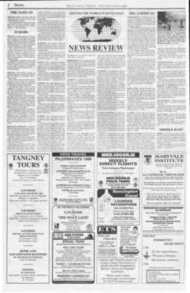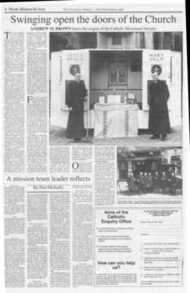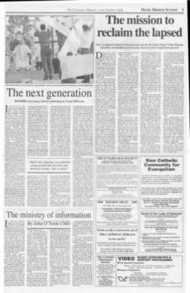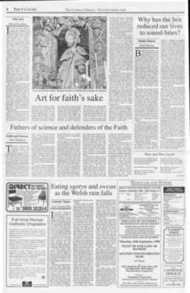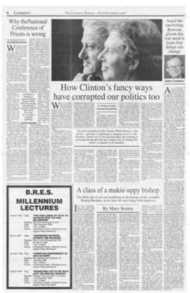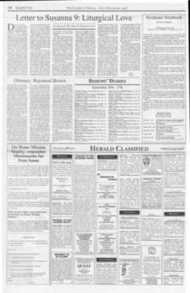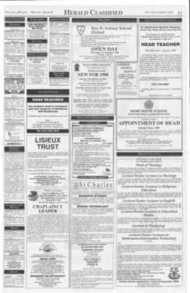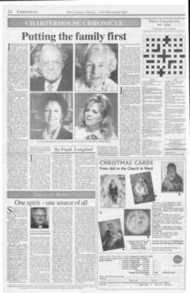Page 7, 18th September 1998
Page 7

Report an error
Noticed an error on this page?If you've noticed an error in this article please click here to report it.
Tags
Share
Related articles
The Absolute Truth
Abiaute Truth And
Catholic Bbc Presenter Sacked From The Today Programme
New Paperbacks
The Man From 'today' Cannot Resist A Final Dig
For the Catholic Church, this is the News Truth Edward
Stourton, scion of an old Catholic family, has written a fine book about the Church, says Alberic Stacpoole OSB
Absolute Truth: The Catholic Church in the World Today by Edward Stourton, Viking £20
IT IS NOW CUSTOMARY for television journalists to put a book alongside a serious series, adding depth and permanence to the picture-play. This is that. It is a kind of advance Spirit Zone for the Millennium. Edward Stourton is particularly qualified for his set task. A Catholic from an eminent Catholic family, he was educated at Ampleforth. A former President of the Cambridge Union, he has lived in Africa, west and east. He has covered Poland for ITV. Washington for Channel Four, and Paris for the BBC. He was diplomatic editor for ITN before rejoining the BBC as a news presenter. He appreciates the difference between the Church living in states of stability and the Church living in states of raw urgency; between theology done in academic halls, and theology done on the hoof.
Book and series vied for attention: the book script's April deadline claimed priority. so further insights come only on camera. Filming began in January, and extra visits were made later to Poland and the Vatican. Five Cardinals emerged from these, for their fine clarity of mind in advanced age and their political penetration: Secretary of State Agostino Casaroli, who died on 8 June; Archbishop Franz Konig, retired; theologian Josef Ratzinger of Munich, now a Vatican Prefect: Human Rights champion Paolo Anis of Sao Paolo, a worrier; and Hume himself!
As a boy Edward Stourton felt both alienated in his homeland and that he belonged to "the best and biggest club in the world". Recent investigations showed him "the breathtaking scale of the Church's ambition in its claim to universality". What is his thesis? He attempts to assess whether Vatican It's grand ambition to engage with the world has borne fruit in the way the world is now ordered. In a worldly way. he asks "whether Catholicism can still influence politics and society". He asks how significant has John Paul's papacy been in the collapse of Communism; and what his Polish achievement means for the Church.
What is his dilemma? It is the cause of his title, Absolute Truth, that the swim of life confronts contradictory interpretations. For the religious. the Polish Pope of the 1980s was God's instrument in undermining Communism, while for the "hard fact" journalist he stands as a factor no more significant than Mikhail Gorbachev. Catholicism is founded on respect for authority. belief in absolute truth. acceptance of the universality of the gospel Good News. It attracts, even from the most ambivalent, an innate loyalty and desire to belong:Egregious challengers like Hans Kting do not dislike the Pope. while they may characterise him as an Eastern Europe despot: Kiing only dislikes the doctrine of Infallibility enshrined in the papacy. Those who float into schism soon float back forgiving and forgiven. Even Lefebvrist traditionalists discover where tradition lies, guarded.
We are taken, by description or camera. to St Peter's Square — "the power of spectacle" — before being given a picture summed up by The Simple Prayer Book. Vatican II begins with Cardinals joining cabals. while the press is excluded. They are let in. and it becomes a "people's council", power passing from elite to people while people watch and read. Cardinal Hume provides the significant symbol: "What the new liturgy gained was a sense of community around the altar: but what it lost was a sense of the numinous. of mystery". Transcendentalists mourned. while imrnaneritists called on God to "do something". The Amer
icans persuaded Paul VI that the right to religious freedom is based not on freedom of conscience (which is dangerous) but on the dignity of the person and the principles of social order" flowing therefrom — i.e. not dark subjectivity. The present Pope would make much of that emphasis.
We are taken on tour to Zambia, HIV and Sister Leonia, nurse and nun. Then on to 1968's Humanae Vitae. and consequent pick-your-own Catholicism: and thereafter seminaries or churches were emptier. Paul VI never wrote another encyclical. Enter Karol Wojtyla, poet and pastor, philosopher and prelate; and, with his election, nationhood and Solidarity. Then Gorbachev
asked that he and the Pope should "let Europe breathe with two lungs". Power in Poland passed to the embattled Church. then from the free Church; Stourton handles that well, partly from his presence there.
We are taken to El Salvador and the martyr, Mgr Oscar Romero, who soon became a focus for mythmaking. his home a shrine. his clothes relics. Then on to the Latin American Church, then Liberation Theology, then back to Cardinal Ratzinger. whose name is uttered worldwide "as a mixture of fear. respect, awe and loathing-. (He is the son of a German policeman.) For him, faith and politics never mix: for him. all Churches are fragments of the one Church of Christ
fragments without final authority! The picture Stourton provides of "Deadly Errors" is salutary. Names like Friar Hoff leave the priesthood.
We tour on to India and Sri Lanka, and other priestconfronters, such as Fr Balasuriya. author of Mary & Human Liberation, about a feminine icon of political
activism. The phrase appears from authority: "detrimental to the faith". Here Stourton cleverly handles Council texts, papal writings and Asian theology; later
he records the ungenerous and clumsy reinstatement of the author of Mary & Human Liberation. It is said of
Fr Balasuriya that he looks upon Rome from the stance
of rebels testing principles. But then, rebels do raise valid but unsung truths. Extra Ecclesia nulla salus
should be peaceably interpreted: there are no secondclass citizens in Catholicism. There is blessedly a new creativity among Indian theologians: God, they say, is a mystery, unexhausted by all religion — and so perhaps there is room for benign pluralism.
Edward Stourton has good judgement and selectivity. He gives a good view of Africa's Church, by way of Archbishop Milingo's healing story. He has a good sense of the local reality as being in communion with all other local Churches, helped by the Holy Father — that way round. He admits that Rome's centripetal force may crack under the pull of the periphery, or corrode from the habit of disobedience beyond, or corrupt through secularisation. He sees the Councils as places where enlightened history confronts Unchanging Truth, but where the edifice is shaken by culture.
He is reluctant to end on a calm note. He speaks of the Pope as a "Cold War superstar", now sunk to the back pages of journalism, yet prepared to be succeeded by a prelate in his own image (since he appointed fourfifths of the world's cardinals). He speaks of the next Pope perforce deserting the 2.000-year relationship between Western civilization and the Western Church. Rome as a locus may be evacuated by a Pope from else where. Perhaps a future African/American/Asian Pope will be more concerned with "the developing world", priority being given to poverty or Aids. to the erosion of concentrated celibacy and the advent of women priests. Without any ideological dragon left to slay, whither goes the New Church?
WE NOW LIVE in a world freed of moral challenge by market forces and galloping technology. where choice hardly touches religion or moral dimension. The rich are stifled spiritually, by "having"; the poor physically, in their "being" — and moderation is the victim. Stourton says this: "Only a Church that aspires to universality can make a real attempt to find a common humanity". He cites John XXIII in 1962, that in the ages of man the mysterious providence of God the guiding event for the Church's good. But sometimes the journalist in him asks how much Rome' s driver is in control, and where is he driving us? The Church does not nurture its own "ambition to universality", in Stourton's phrase. but a yearning to seek God and serve.
Since all this was written and filmed. the world map has fiercely changed, and an epilogue is perhaps needed. The Far East has suffered economic collapse: even Hong Kong tourism and property have slumped. China. by ecological imprudence, has flooded its productivity. Russia is losing its roubles and its government. Islam lapses into terrorist threats. Rome awaits the Millennium and a renewed papacy. Even Britain dabbles with constitutional changes that may include Church-State disestablislunent. Does all this undermine the picture of Absolute Truth?
blog comments powered by Disqus



